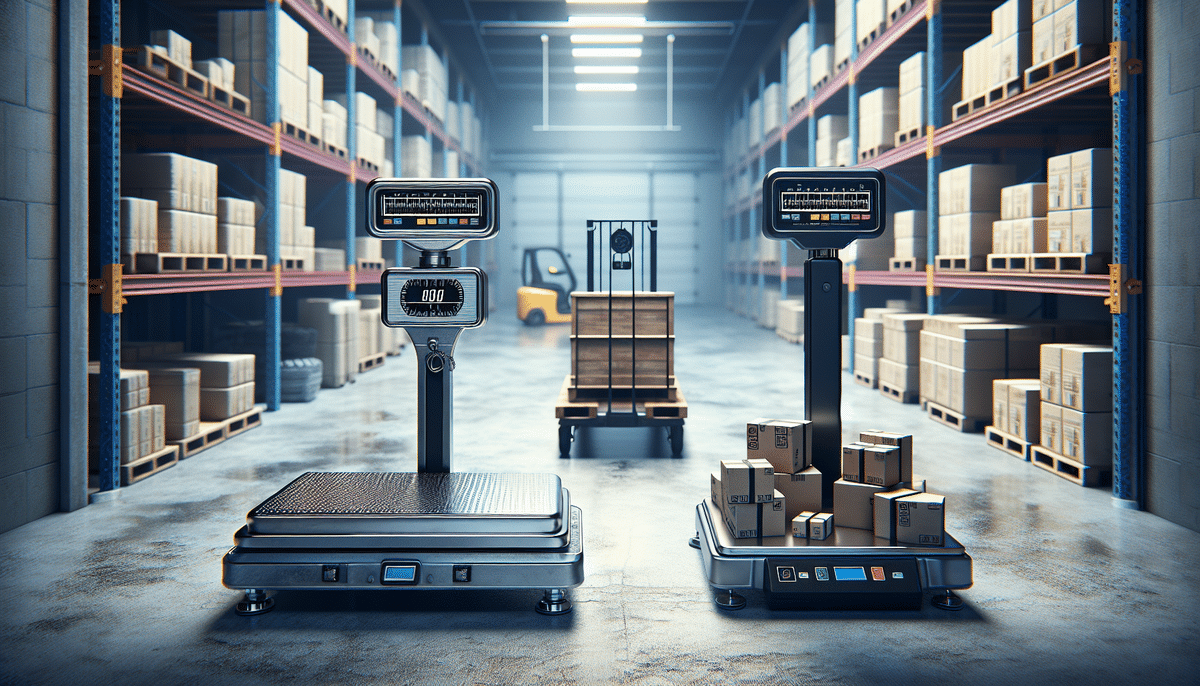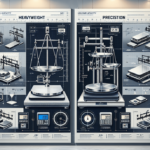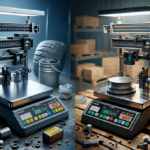Angel USA Extra Large Platform vs Salter Brecknell LPS-400: A Comprehensive Comparison
Industrial weighing scales are critical components in the operations of numerous businesses across various sectors. These scales are designed for high-capacity and heavy-duty weighing of materials, ensuring precision and efficiency. In this article, we compare two prominent high-capacity weighing scales – the Angel USA Extra Large Platform and the Salter Brecknell LPS-400. We explore their features, accuracy, build quality, ease of use, maintenance, pricing, and customer feedback to help you determine which scale best fits your business needs.
Introduction to Industrial Weighing Scales
Industrial weighing scales are engineered to handle substantial loads and provide precise weight measurements. They are widely used in industries such as manufacturing, agriculture, logistics, and mining, where accurate measurements of heavy objects like raw materials and finished products are critical. The accuracy, durability, and reliability of these scales are paramount to maintaining efficient business operations.
According to the MarketWatch 2023 Industrial Scale Report, the global market for industrial scales is projected to grow steadily, driven by increasing demand for precision and automation in various industries.
Different types of industrial weighing scales cater to diverse needs, including:
- Floor Scales: Designed for placement on the ground, capable of handling loads up to several tons.
- Bench Scales: Smaller and portable, ideal for compact workspaces.
- Crane Scales: Used to weigh objects suspended from a crane.
- Pallet Jack Scales: Specifically for weighing pallets and other large, movable objects.
Understanding the Need for High-Capacity Weighing Scales
High-capacity weighing scales are crucial for industries dealing with bulk materials and large products. These scales can measure weights ranging up to several tons, making them suitable for applications like weighing large trucks, shipping containers, and industrial machinery. Accurate weight readings are essential for:
- Ensuring worker safety
- Preventing equipment damage
- Reducing material wastage
- Complying with regulatory standards
Additionally, high-capacity scales enhance operational efficiency. By providing precise measurements, businesses can optimize production processes, plan efficient transportation routes, and minimize costs. For example, knowing the exact weight of a shipment helps in selecting the most fuel-efficient transport method, thereby reducing expenses and delivery times.
According to the Frost & Sullivan Industrial Weighing Surveys, businesses that utilize high-capacity scales report up to a 15% increase in operational efficiency due to improved accuracy in weight measurement.
The versatility of high-capacity scales allows their use across various industries, including agriculture, mining, construction, and logistics. Many models offer customizable features such as remote displays, wireless connectivity, and rugged construction to withstand harsh environments, ensuring they meet the specific demands of each industry.
Comparison Between Angel USA Extra Large Platform and Salter Brecknell LPS-400
In this section, we compare the Angel USA Extra Large Platform and the Salter Brecknell LPS-400 based on key aspects like features, accuracy, build quality, ease of use, maintenance, pricing, and customer feedback.
Weight Capacity and Accuracy
The Angel USA Extra Large Platform offers a substantial weight capacity of up to 10,000 pounds, making it ideal for heavy-duty applications such as weighing large vehicles and industrial machinery. In contrast, the Salter Brecknell LPS-400 supports up to 400 pounds, suitable for lighter industrial tasks like inventory management and small-scale manufacturing.
Both scales are equipped with four load cells ensuring accurate weight measurements. The Salter Brecknell LPS-400 boasts a readability of 0.1 lbs, offering higher precision compared to the Angel USA’s readability of 0.2 lbs. According to the National Institute of Standards and Technology, a higher readability allows for more precise measurements, which is crucial in applications requiring fine accuracy.
Build Quality and Design
The Angel USA scale features a robust platform constructed from heavy-duty stainless steel, designed to withstand harsh industrial environments. It includes a built-in ramp for easy loading and unloading of heavy items, enhancing user convenience and safety.
On the other hand, the Salter Brecknell LPS-400 has a compact, low-profile platform made of durable steel, making it more portable and easier to store. Its design includes two wheels for effortless movement, which is particularly beneficial in dynamic workspaces where equipment needs to be relocated frequently.
Features and Functionality
- Angel USA Extra Large Platform:
- Large LCD display for easy reading
- Rechargeable battery with up to 100 hours of life
- Tare function for subtracting container weights
- Remote display and printer compatibility
- Computer interface for data transfer and analysis
- IP65 rated for dust and water resistance
- Salter Brecknell LPS-400:
- Backlit LCD display for better visibility
- Rechargeable battery lasting up to 100 hours
- Programmable auto shut-off for power saving
- Hold function to freeze weight readings
- User-friendly interface with large, easy-to-press buttons
- Integrated tare and total functions
Ease of Use and Maintenance
Both scales are designed for user-friendly operation and require minimal maintenance. The Angel USA Extra Large Platform features an intuitive display and controls, along with a low profile for easy loading. Its non-slip surface ensures stability during weighing, and adjustable feet allow for leveling on uneven surfaces.
The Salter Brecknell LPS-400 emphasizes portability with its integrated wheels and compact size. The simple keypad is accessible even with gloves, making it suitable for various working conditions. Regular maintenance, such as cleaning and calibration, is straightforward for both models, ensuring long-term accuracy and reliability.
According to OSHA guidelines, regular maintenance and proper usage of industrial scales significantly reduce the risk of workplace accidents and equipment failures.
Pricing
The Angel USA Extra Large Platform is positioned at a higher price point due to its extensive features and higher weight capacity. As of 2024, it is priced around $3,500, reflecting its advanced capabilities and robust construction. In contrast, the Salter Brecknell LPS-400 is more cost-effective, priced approximately at $600, making it accessible for businesses with lighter weighing needs or smaller budgets.
Customer Reviews and Feedback
Both scales have garnered positive reviews for their accuracy, durability, and ease of use. Customers appreciate the Angel USA platform’s robust construction and extensive feature set. However, some have noted its higher price as a drawback.
The Salter Brecknell LPS-400 is praised for its portability and affordability, though some users have raised concerns about its lower weight capacity for heavier industrial applications. According to the TrustRadius user reviews, the overall satisfaction rate for both scales is above 4 out of 5 stars, highlighting their reliability and performance.
Conclusion: Which Scale is Better for Your Business Needs?
The choice between the Angel USA Extra Large Platform and the Salter Brecknell LPS-400 depends on your specific business requirements and budget.
- Choose Angel USA Extra Large Platform if:
- You require a high weight capacity (up to 10,000 lbs)
- Operating in environments that demand durability and robustness
- Need advanced features like remote displays and data integration
- Choose Salter Brecknell LPS-400 if:
- Portability and ease of movement are priorities
- Managing lighter loads (up to 400 lbs)
- Looking for a cost-effective solution
Pros and Cons of Each Scale
Below is a summary of the advantages and disadvantages of each scale:
- Angel USA Extra Large Platform
- Pros:
- Higher weight capacity (up to 10,000 lbs)
- Sturdy, durable construction
- Long battery life
- Advanced features and accessories
- IP65 rated for enhanced protection
- Cons:
- Higher price point
- Bulkier size may require more space
- Pros:
- Salter Brecknell LPS-400
- Pros:
- Portable and easy to move
- Cost-effective
- User-friendly interface
- Compact design saves space
- Cons:
- Lower weight capacity (up to 400 lbs)
- Less advanced features compared to Angel USA
- Pros:
Factors to Consider Before Purchasing a High-Capacity Industrial Weighing Scale
When selecting a high-capacity industrial weighing scale, consider the following factors to ensure it meets your business needs:
- Weight Capacity: Ensure the scale can handle the maximum weight you intend to measure.
- Accuracy: High precision is crucial for reliable measurements.
- Build Quality: Durable materials extend the scale’s lifespan, especially in demanding environments.
- Platform Size: Adequate space is necessary for the items being weighed.
- Portability: If mobility is required, features like wheels and lightweight construction are important.
- Ease of Use: Intuitive controls and clear displays enhance operational efficiency.
- Maintenance: Simple maintenance procedures ensure long-term functionality.
- Price: Balance between budget constraints and required features.
- Compliance: Ensure the scale meets industry standards and regulatory requirements.
How to Properly Maintain an Industrial Weighing Scale
Proper maintenance is essential to ensure the longevity and accuracy of an industrial weighing scale. Follow these guidelines to maintain your scale:
- Regular Cleaning: Keep the scale clean from dust, debris, and spills to prevent damage to the load cells and display.
- Load Cell Inspection: Regularly check for any signs of damage or wear on the load cells.
- Leveling the Scale: Ensure the scale is properly leveled to maintain measurement accuracy. Use adjustable feet if available.
- Calibration: Perform periodic calibrations as per the manufacturer’s instructions to maintain precision.
- Battery Maintenance: For scales with rechargeable batteries, ensure they are charged according to guidelines to prevent battery degradation.
- Software Updates: If applicable, keep the scale’s software updated to benefit from the latest features and improvements.
Adhering to these maintenance practices will help sustain the scale’s performance and prevent costly repairs or inaccuracies in the future.
Different Types of Industrial Weighing Scales
Industrial weighing scales come in various types, each designed for specific applications:
- Bench Scales: Suitable for smaller, lighter objects and portable use.
- Floor Scales: Ideal for heavy loads and large items, often used in warehouses and manufacturing plants.
- Pallet Truck Scales: Designed to weigh pallets and goods being transported through a pallet truck.
- Crane Scales: Used for weighing items lifted by a crane, commonly found in construction and shipping industries.
- Truck Scales: Built to weigh entire vehicles, ensuring compliance with transportation regulations.
Choosing the right type of scale depends on your specific business needs, such as the size and weight of the items you need to measure, the working environment, and whether portability is a requirement.
Overall, selecting the appropriate high-capacity weighing scale is a critical decision for businesses requiring precise and reliable weight measurements. Both the Angel USA Extra Large Platform and the Salter Brecknell LPS-400 offer excellent features, and the best choice will depend on your specific operational requirements and budget constraints. Consider the factors discussed in this article to make an informed decision that aligns with your business objectives.
Additional Resources
For more information on industrial weighing scales and best practices, visit:




















